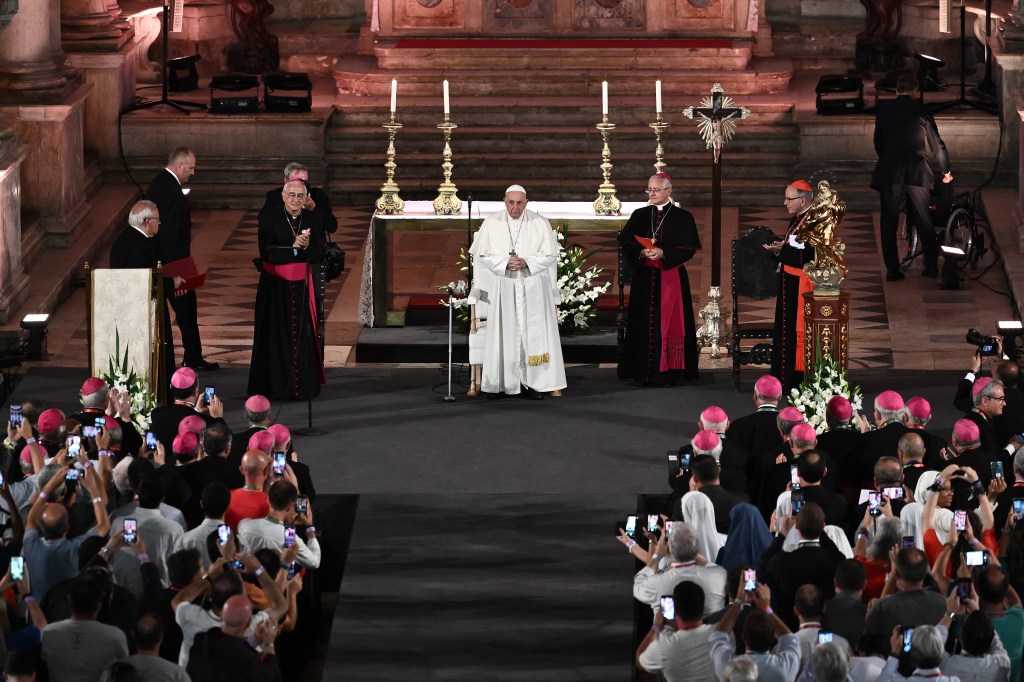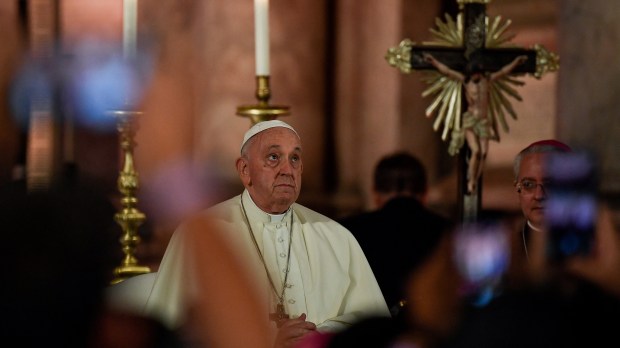Pope Francis had encouraging words for the clergy and religious of Portugal, acknowledging that it is easy to feel weary when trying to work for Christ in “countries of ancient Christian tradition, buffeted by social and cultural changes and increasingly marked by secularism, indifference to God, and growing detachment from the practice of the faith.”
But, he said, this is how Jesus found the first disciples, who were washing their nets after a night of hard work with no results.
We immediately note the contrast: the fishers leave the boat to wash their nets, that is, to clean and repair them, and then to return home, whereas Jesus gets into the boat and invites them to let down their nets for a catch. We see the difference: the disciples get out of the boat, while Jesus gets into the boat; they want to put away their nets, while he wants them to lower them once more into the sea for a catch.
The Pope pointed out that in this scene, “Christ wanted to bring God’s closeness into the very places and situations in which people live, work and hope, sometimes clinging to their past failures and their shortcomings.”
Whenever we feel discouraged (and here each of us can think of times when we felt discouraged), we may feel tempted to leave the boat and become entangled in the nets of resignation and pessimism. Instead, let us trust that Jesus continues to take us by the hand, lifting up his beloved Bride. Let us bring our struggles and our tears to the Lord, in order then to respond to pastoral and spiritual needs, together, with open hearts and finding new ways to follow him.

More advice
In his address to the Church leaders of Portugal, the Pope offered advice on prayer, on closeness, on evangelizing, and other themes.
Here is some of what he said.
We need Adoration
How do I pray? Like a parrot? “blah, blah, blah,” half asleep before the tabernacle because I don’t know how to talk to the Lord. Do I pray? How do I pray? Only in adoration, only in the presence of the Lord, do we truly rediscover our taste and passion for evangelization. Oddly enough, we have lost the prayer of adoration; and everyone, priests, bishops consecrated men and women, need to recover it, this ability to be quiet in the Lord’s presence. Mother Teresa [of Calcutta], busy about so many things in life, never neglected adoration, even at times when her faith was shaken and she wondered if it was all true or not. A similar moment of darkness was also experienced by Therese of the Child Jesus. In prayer, we overcome the temptation to carry out a “ministry of nostalgia and regrets”. Once, in a convent, there was a nun – this really happened – who complained about everything. I forget her name, but the other nuns called her “Sister Lamentation”. How many times do we turn our frustrations and disappointments into complaints! Once we abandon those complaints, we find the strength to put out once more into the deep, without ideologies, without worldliness
We need togetherness
In the Gospel, Jesus gives Peter the task of putting out into the deep, but then, speaking in the plural, tells the others: “Let down your nets” (Lk 5:4). Peter guides the barque, but others are on board and all of them are called to lower their nets. Together. And when they take in a great catch of fish, they do not think they can do it alone, or treat the boon as their private possession and property but, as the Gospel tells us, “they signaled their partners in the other boat to come and help them” (Lk 5:7). In this way, they filled two boats, not one. “One” speaks to us of solitude, self-absorption, the illusion of self-sufficiency, whereas “two” speaks of relationship. The Church is synodal: she is communion, mutual assistance and shared journey. That is the aim of the current Synod, which will have its first general assembly in October. On the boat of the Church, there has to be room for everyone: all the baptized are called on board to lower the nets, becoming personally involved in the preaching of the Gospel. Do not forget this word: together! I am deeply touched, whenever I speak about opening apostolic perspectives, by that passage of the Gospel in which the wedding feast of the son is all prepared, and people do not come to it. So, what does the Lord, the master of the feast, say? “Go out to the highways and byways and bring everyone, everyone: the sick, the healthy, young and old, the righteous and sinners. Everyone!” Do not make the Church a customs station, selecting who can enter or not. All, with their past life, their sins, as they are, before God, as they are, before life. All of them. Let us not have customs houses in the Church.
Bishops with priests, priests with each other, and laity
The nets of the first disciples can thus serve as an image of the Church, which is a “network of relationships,” human, spiritual and pastoral. When dialogue, co-responsibility and participation are lacking, the Church grows old. I would put it this way: never a Bishop without his priests and the people of God; never a priest without his brother priests; and all of us together, as Church – priests, consecrated men and women, and the lay faithful – never without others, never without the world. Without worldliness, to be sure, yet not without the world. In the Church, we help each other, we support one another and we feel ourselves called to spread a climate of constructive fraternity beyond our own walls. For that matter, Saint Peter tells us that we are living stones being built into a spiritual house (cf. 1 Pet 2:5).
We need to invite
To become fishers of men and women. Do not be afraid. This is not to practice proselytism; it is to proclaim the challenging message of the Gospel. Jesus uses that fine image: fishers of men and women. Jesus entrusts his disciples with the mission of putting out into the sea of the world. In the Scriptures, the sea is often seen as the haunt of malign and adverse powers that human beings are incapable of controlling. So to be “fishers of men and women” and to draw them out of the water means to help them to return to the place from which they have fallen, to save them from the evil that threatens to overwhelm them, to revive them from every form of death. But to do this without proselytism, but with love. … The Gospel is a proclamation of life amid the abyss of death, of freedom amid the eddies of enslavement, of light in the depth of darkness. In the words of Saint Ambrose, “the means to be used in apostolic fishing are like nets: for nets do not kill the catch but keep it alive; they drag it from the depths into the light” (Exp. Luc. IV, 68-79). There is so much darkness in today’s society, also here in Portugal, everywhere. We seem to have lost a sense of enthusiasm, the courage to dream, the strength to confront challenges and to be confident about the future; and so we sail amid doubts and uncertainty, especially economic uncertainty, an impoverishment of social friendship, and lack of hope. As Church, we are entrusted with the task of putting out into the waters of this sea and casting the nets of the Gospel, not pointing fingers, not accusing, but bringing to the men and women of our time an offer of life, the life of Jesus. We are called to bring to them the openness of the Gospel, to invite them to the party, to a multicultural society; to bring the closeness of the Father to situations of increasing uncertainty and poverty, especially among young people. To bring the love of Christ wherever families are fragile and relationships wounded. To transmit the joy of the Spirit where discouragement and fatalism reign.


